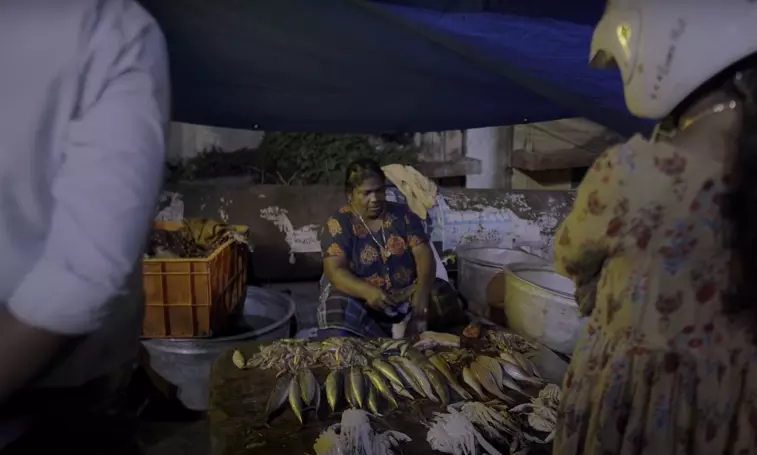

A still from 21 Hours
'21 Hours': A story of time and tide on Women's Day
text_fields"I have many stories," Rajamma, the fisherwoman, says as she deftly strips and peels at a hunk of fish in her hands. "If I start telling you, there won't be enough days left to finish them all."
And yet, in Sunitha CV's documentary '21 Hours: A Story of Toil, Travel and Trade', some aspects of those many untold stories are captured, from Rajamma's daily drudgery to the flashes of her long and difficult life as one of Kerala's many unskilled labourers.
Rajamma's day begins at 3:30 with a trip through the darkness to Thoothukudy Harbour, 200 km away in Tamil Nadu. Again Basith's camera deftly shifts between a long, poignant focus on her lined face and the gleaming scales of fish, tying her together with the profession she returned to out of sheer passion.
She laments about the distance and the lack of fish in the sea, recalling that it was once possible to get fish from near Trivandrum. Now bigger fisheries, foreign boats and a general lack of fish have brought her to Tamil Nadu in search of fresh catch.
With lockdown and fishing restrictions having hit the community hard, Rajamma reminisces on her many hardships, including marriage at 19 and having to work shortly after giving birth. Though her children are all educated - an engineer, a teacher, an MBA pass - she reveals that life is still difficult with them gone to struggle abroad as she struggled to bring them up by selling fish. Health problems from years of cutting fish and her many pregnancies are also starting to catch up.
From her usual selling point at Kuravankonam in Trivandrum, Rajamma recalls some of the persecutions she faced. "I quoted ₹700 for an order, and he said I could not sell fish there any longer," she recalls in a resigned voice. "He kicked over my stock…I realised I couldn't sell here any longer."
Although intervention came in the form of a media outcry and action by local fishermen unions, Rajamma still faces drudgery due to heavy competition from larger shops which she says grab the best and largest fish from the harbours and leave little for smaller sellers like herself. Unable to compete with these shops' customer service and variety, she is forced to rely on years of customer loyalty that she has built. Even distant political firestorms, such as the establishment of the Vizhinjam port resulting in the erosion of much of Trivandrum's coastline and leading to less space for fisher people to ply their craft, have deeply affected her fortunes.
Even when attending auctions for fish in the Thoothukudy markets, Rajamma reveals that the place is heavily dominated by men. However, with time and effort, she has carved a niche for herself in the hearts and minds of vendors.
Despite the toil she endlessly undergoes, the fisherwoman's grit and attitude keep her going day after day to the markets, in an endless cycle of scraping together enough money to get by. This story on Women's Day marks India's untold, unskilled labourers, many of whom are women whose lack of glamourous profession makes them unworthy of sustained media focus.










